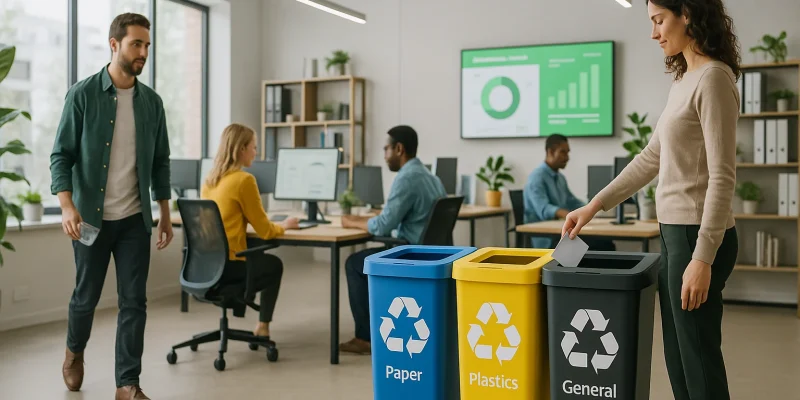
Smart Office Waste Collection Strategies for a More Sustainable Workplace
Effective office management is about more than just productivity and workflow, it’s also about maintaining a safe, tidy, and sustainable workspace.
One area that often goes under the radar is office waste collection, yet it can have a significant impact on both operational efficiency and environmental responsibility.
When managed intelligently, office waste collection not only reduces costs but also supports corporate sustainability goals, enhances staff engagement, and demonstrates to clients and visitors that your business is committed to responsible practices.
This article explores three key strategies to improve waste management in offices while fostering a greener workplace culture.
What Are the Smart Office Waste Collection Strategies for a More Sustainable Workplace?
Assessing and Planning Your Waste Strategy

Before making changes, it’s crucial to understand your office’s current waste patterns. Conducting a waste audit can reveal what types of waste are produced, the volumes generated, and where inefficiencies exist.
Offices typically produce paper, cardboard, plastics, and electronic waste. However, the proportions can vary widely depending on the size of the business, the nature of operations, and staff habits.
Knowing exactly what your office generates allows you to plan an effective collection schedule and choose appropriate containers.
Optimise Collection Schedules
Many offices schedule collections based on generic patterns, such as weekly pickups, without considering actual waste output.
Too frequent collections lead to unnecessary costs, while infrequent pickups can result in overflowing bins and hygiene concerns.
Flexible office waste collection services allow businesses to adjust frequency based on real needs.
For example, a busy open-plan office may require more frequent paper and general waste collection, whereas a smaller team can manage with fewer pickups.
Aligning collection schedules with actual waste production improves efficiency and reduces costs.
Set Up Clear Internal Policies
Once a plan is in place, communicate it clearly to staff. Creating a simple, visible waste management policy helps employees understand what goes where, reducing contamination and improving recycling rates.
Simple signage, colour-coded bins, and quick reference guides can make the process intuitive.
The more visible and straightforward your policies, the more likely staff are to follow them consistently.
Engaging Staff and Improving Segregation
The most effective waste management system relies on staff participation. Employees are at the heart of day-to-day operations, so their engagement is key to reducing waste, increasing recycling, and maintaining a clean workplace.
Implement Waste Segregation
Segregating waste at the source is essential. Offices should have designated bins for:
- General waste
- Paper and cardboard
- Plastics and recyclables
- Electronic waste
By keeping waste streams separate, you reduce contamination and make recycling far more effective.
Colour-coded bins, clear signage, and accessible disposal points all contribute to better compliance.
Educate and Incentivise Staff
Staff engagement can be boosted through training sessions, team challenges, or small incentives. Introducing a “green champion” role within departments encourages employees to take ownership of waste reduction initiatives.
Education can extend beyond simple bin usage to include digital practices such as minimising printing, reusing materials, and opting for eco-friendly office supplies.
Employees who understand the environmental and financial benefits of good waste management are more likely to support and sustain the programme.
Partner with a Reliable Provider
Selecting the right waste collection partner is also crucial. A reputable office waste collection service should offer:
- Transparent pricing and flexible contracts
- Recycling solutions for paper, plastics, and electronics
- Scheduled collections tailored to your office’s needs
- Compliance with environmental and health regulations
A trusted partner ensures that waste is handled efficiently, leaving staff free to focus on their core responsibilities.
Long-Term Benefits and Sustainability
Implementing smarter office waste collection strategies has far-reaching advantages. Beyond immediate cost savings, there are significant environmental, reputational, and operational benefits.
Reduce Costs and Increase Efficiency
Efficient collection reduces unnecessary pickups, minimises landfill contributions, and can even provide opportunities for recycling revenue.
Organised waste systems also keep office spaces tidy and safe, supporting productivity and reducing risks.
Enhance Corporate Sustainability
Sustainability is increasingly important to employees, clients, and stakeholders.
Businesses that demonstrate a commitment to responsible waste management show that they value the environment and operate ethically.
Many offices are also aiming to become carbon neutral, with waste reduction forming a key part of this strategy.
These efforts help improve brand reputation while supporting long-term corporate goals.
Foster a Positive Workplace Culture

Engaging employees in sustainability initiatives boosts morale and creates a sense of shared purpose.
Staff are more likely to feel proud of their workplace when they can see tangible results, such as increased recycling rates or reduced waste volumes.
Moreover, a culture of sustainability often extends beyond the office. Employees may adopt eco-friendly habits at home, while clients and visitors notice the business’s commitment, enhancing trust and credibility.
Contribute to the Wider Community
Smarter waste management has benefits that extend beyond your office walls. Reducing landfill contributions, promoting recycling, and supporting energy recovery initiatives all contribute to a cleaner, healthier local environment.
Offices that lead by example can inspire other organisations to adopt similar practices, creating a ripple effect across the community.
Smarter office waste collection is more than an operational necessity it’s a strategic opportunity.
By assessing waste streams, engaging staff, partnering with reliable providers, and fostering a culture of sustainability, offices can reduce costs, improve efficiency, and strengthen their environmental credentials.





